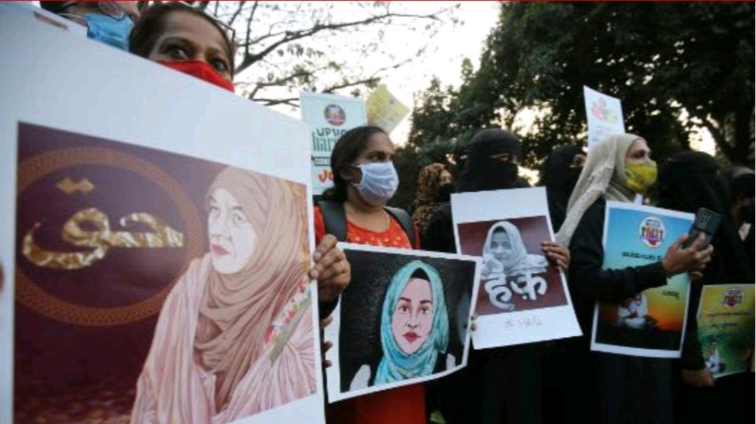An Indian high court has upheld a ban on the wearing of hijabs or headscarves in educational institutes in Karnataka state, weeks after religious clashes erupted over the right to wear the Islamic garment in schools.
The state's top court on Tuesday ruled that the hijab was not an "essential religious practice in Islamic faith" and dismissed a set of petitions filed by Muslim students denied entry to classrooms in multiple schools and colleges across the state.
The court also ruled that requirement for students to comply with school uniforms is a "reasonable restriction, constitutionally permissible and which the students cannot object to."
Karnataka Chief Minister Basavaraj Bommai appealed for calm after the ruling, which authorities feared could reignite religious protests.
"I request everybody to follow the high court order and maintain peace and order," Bommai told reporters Tuesday. "And allow the children to do their education as usual."
The controversy erupted after students staged a small protest in January demanding they be allowed inside the classroom while wearing the Islamic garments.
Their demonstration prompted rival protests from right-wing Hindus carrying saffron scarves -- a color widely associated with Hinduism -- - and chanting a religious Hindu slogan in support of Indian Prime Minister Narendra Modi's ruling Bharatiya Janata Party (BJP).
The dispute was seen as a symbol of deepening religious tensions in the state, where authorities ordered the closure of all high schools and colleges for several days to discourage protests in early February. Rallies in the state's capital, Bengaluru, were also banned outside educational institutions for two weeks.
Scores of women from other Indian cities, including capital Delhi, Hyderabad and Kolkata, also took to the streets in support of the Muslim girls.
State authorities had supported the hijab ban, citing the state's mandate on religious attire.
But experts and activists say the hijab row runs deeper than a dress code, claiming it's indicative of a wider crackdown on India's minority Muslim population since Modi's BJP came to power almost eight years ago.
Karnataka -- where just 13% of the population is Muslim -- is governed by the BJP, and the state has already passed legislation critics say favors Hindus.
Lawyer Mohammed Tahir, who represented one group of petitioners in court, told CNN last month that Karnataka was a "hotbed" of Hindutva ideology, supported by many right-wing groups, which seeks to make India the land of the Hindus.
"We welcome the verdict. However, we are yet to ascertain the reasoning," one of the girls' lawyers, Shatabish Shivanna, told CNN of Tuesday's judgment.
"We will talk to the petitioners and then we will look out to what legal recourse we want to take."
Latest Stories
-
CODEO expands post-election observation to monitor parliamentary disputes
13 minutes -
Ablekuma North, Dome Kwabenya will have MPs-elect before January 7 – EC
26 minutes -
Bills Micro-Credit climax year with durbar and dinner celebration
1 hour -
Lawyer sues Wesley Girls SHS for alleged religious discrimination
1 hour -
Election: We’re not the first EC to re-collate results – Bossman Asare
2 hours -
Kofi Kinaata makes historic comeback with ‘Made in Taadi’ concert
2 hours -
It is unacceptable; EC is becoming a lawless institution – NDC on re-collation justification
2 hours -
24-hour economy in the era of digital currency adoption: Implications on economy in 2025 and beyond
2 hours -
Okaikwei Central Constituency were electoral officials cajoled into declaring wrong person – Asare Bossman
2 hours -
US donates $220k mobile heath clinic van to facilitate medical outreach for Ghanaians
2 hours -
Dining with the Gods… Hands off the Big Chair
3 hours -
Joy FM’s Party in the Park: A day of family fun awaits in Aburi
3 hours -
Mahama urged to stand firm against lobbyists in appointments
3 hours -
SEED Academy Ghana to hold elite Basketball Camp and Leadership Summit on December 26
3 hours -
Kofi Asare criticises delays in Free SHS and WASSCE funding
3 hours

